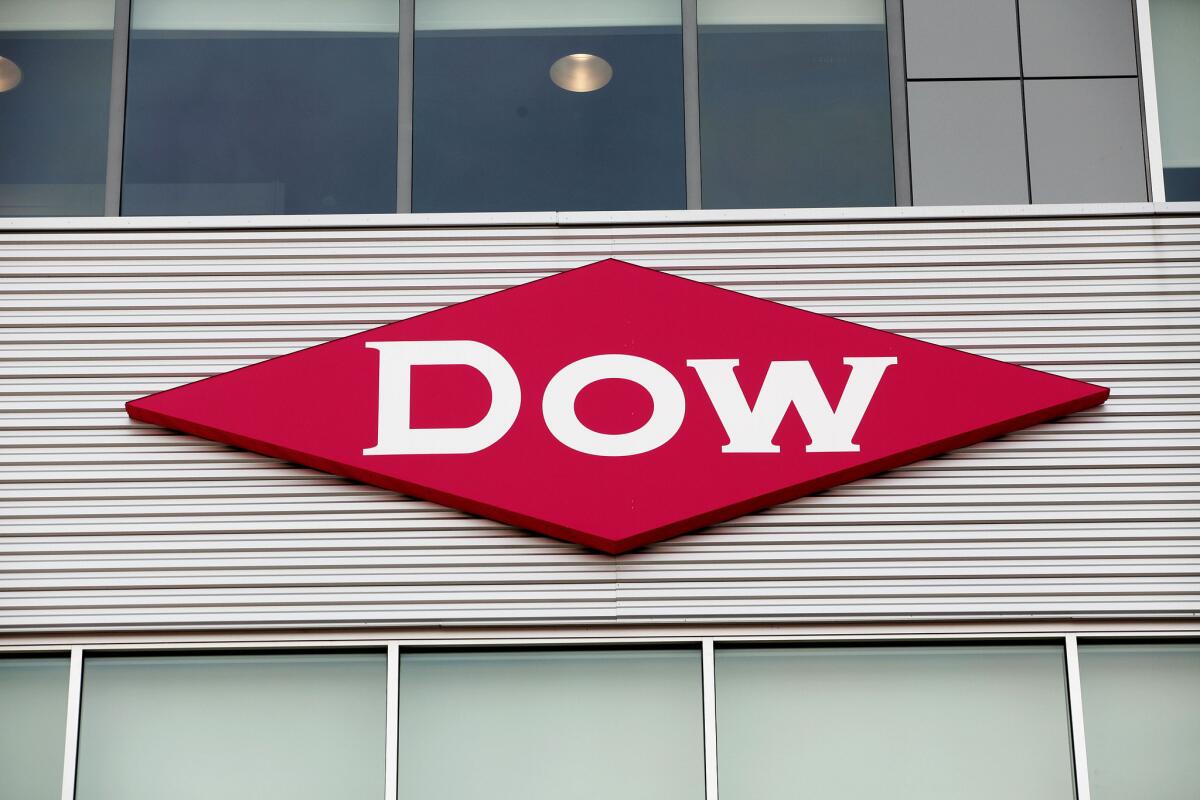Dow and DuPont will merge in a $130-billion megadeal, then split 3 ways

The Dow Chemical logo on a building in downtown Midland, Mich.
- Share via
Venerable U.S. industrial giants Dow Chemical Co. and DuPont Co. said Friday that they had agreed to merge and form a chemicals and agricultural powerhouse valued at $130 billion.
But after the all-stock merger, the new company — to be called DowDuPont — eventually plans to split again into three publicly traded companies, with one focused on agriculture, another on materials and plastics and a third on specialty products.
The proposal “is a real game-changer,” Dow Chemical Co. Chairman Andrew Liveris told analysts on a conference call.
“Each company will be a leader in attractive segments where global challenges are driving demand for these businesses’ distinctive offerings,” he said.
The proposed marriage is the latest blockbuster deal in a record year for corporate mergers and acquisitions worldwide.
The global value of announced transactions so far this year is $4.75 trillion, surpassing the previous record of $4.61 trillion set in 2007, according to the research firm Dealogic.
Many of the deals reflect the companies’ desire to use mergers to step up their growth by giving them added market share, new products or expanded geographic reach.
That’s the case with Dow Chemical and DuPont, which have been grappling with weak prices for certain crops and other commodities, modest revenue gains, the dollar’s strength against foreign currencies and outside pressure from activist investors who want the firms to bolster their growth prospects and cut costs.
The Dow Chemical-DuPont match-up is unusual in that the companies “are very focused on what they want to do with the three spinoffs,” said George Geis, a mergers expert and adjunct professor at UCLA’s Anderson School of Management.
Dow Chemical and DuPont also believe that it’s necessary to merge first to give each of the three spun-off companies enough size and market strength to receive a strong reception on Wall Street when they debut, he said.
But “history shows many other [merger] transactions have not fared so well” in generating the predicted benefits and so investors are “very skeptical as to whether or not they’ll be successful in pulling this off,” Geis said.
Although they’re not splashy consumer brands, Dow Chemical and DuPont manufacture a variety of chemicals, coatings, materials and other items that are integrated into the goods consumers and businesses use every day, including automobiles, apparel, electronics, household items, personal-care products and safety equipment.
They’re also huge players in agriculture, producing seeds, herbicides, insecticides and other products.
Dow Chemical, based in Midland, Mich., had revenue of $58.2 billion last year and employs about 53,000 people.
DuPont, formally E.I. du Pont de Nemours & Co., is a Wilmington, Del., company that had 2014 revenue of $34.7 billion and employs about 63,000.
The companies’ stock prices rose earlier this week in response to media reports of the impending merger, but the stocks retreated after the deal was announced. Dow Chemical’s shares dropped $1.54, or 2.8%, to $53.37.
DuPont’s shares fell $4.11, or 5.5%, to $70.44. DuPont is one of the 30 stocks in the Dow Jones industrial average, and its decline helped drive the blue-chip average lower by 309.54 points to 17,265.21 on Friday.
Still, “this merger makes so much strategic sense,”
Jonas Oxgaard, an analyst with the investment firm Sanford Bernstein, said in a note before the deal was officially announced.
“Both DuPont and Dow have individual issues they’re grappling with,” he said. “They’re not underperforming as companies, but there are things they could do better.”
The merger calls for Dow Chemical stockholders to receive one share of the company for each share they currently own, while DuPont holders would receive 1.282 shares of DowDuPont.
The companies hope to complete the deal in the second half of next year, then pursue the three-way split-up of the new company in the ensuing 18 to 24 months.
As is common with mergers, jobs are expected to be lost.
The companies did not mention layoffs in their announcement, but DuPont said separately that it planned a restructuring that would include $650 million of “employee separation costs” that would affect about 10% of its workforce.
DuPont and Dow Chemical also said they hoped that their merger would produce overall cost savings of $3 billion, which might well include additional job cuts.
Given the proposed new company’s size, the deal also is expected to receive antitrust scrutiny.
“The global nature of the antitrust hurdles are surely likely to be significant” as regulators examine the merger, analyst Mike Ritzenthaler of the investment firm Piper Jaffray & Co. wrote in a note to clients.
But Liveris and other executives told the analysts that the companies’ product lines, including those in agriculture, did not have substantial overlap and that the firms did not expect major antitrust problems.
ALSO
Kitson, boutique for young starlets, is closing all 17 stores
Why Chanel paid a record price for its Rodeo Drive location
David Lazarus: California’s Lemon Law helps protect pricey consumer electronics
More to Read
Inside the business of entertainment
The Wide Shot brings you news, analysis and insights on everything from streaming wars to production — and what it all means for the future.
You may occasionally receive promotional content from the Los Angeles Times.











